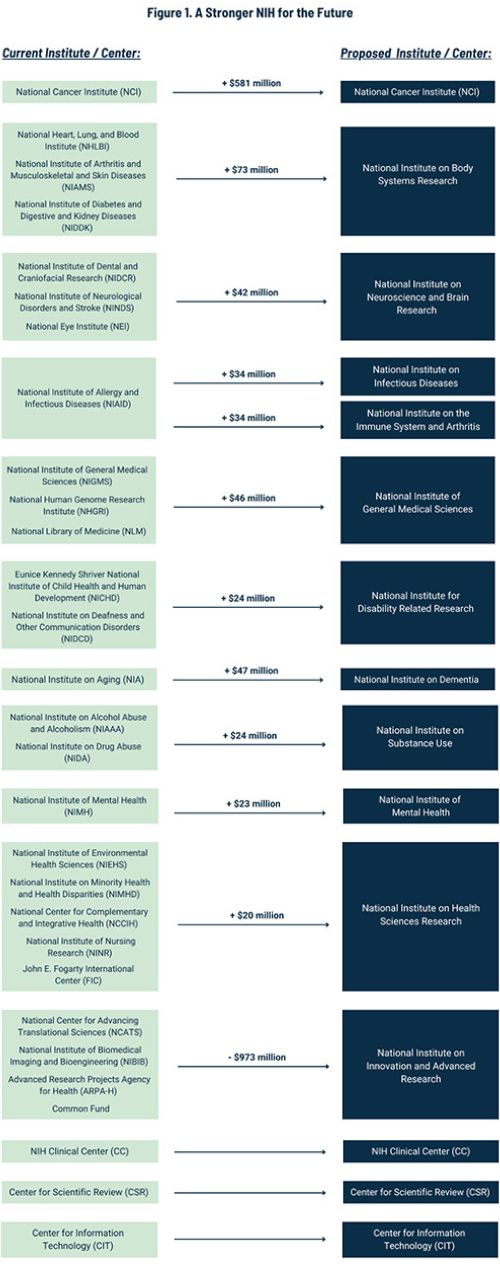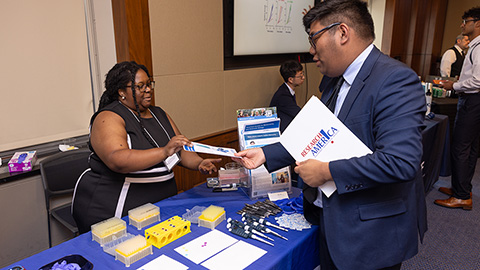ASBMB weighs in on NIH reform proposal
The American Society for Biochemistry and Molecular Biology has responded to a proposal by the chair of the U.S. House Energy and Commerce Committee to reform the National Institutes of Health’s structure and policies.
Rep. Cathy McMorris Rodgers, R-Wash., unveiled the proposal on June 14. It highlighted challenges the NIH faces and recommended a series of reforms, including the consolidation of the 27 institutes and centers into 15.
Ann West, associate vice president for research development and a professor at the University of Oklahoma, leads the ASBMB Public Affairs Advisory Committee.
“A large percentage of ASBMB investigators are funded by the NIH,” West said. “While we are not against reform efforts, we strongly believe that an independent assessment should be carried out and that the scientific community, including professional societies and NIH leadership, need to have input before a plan is executed,” West said.
The ASBMB’s response focused on:
- Prioritizing basic research
- Establishing an agencywide strategy for education and training, policies to ensure equitable funding, and re-entry funding opportunities to support a thriving scientific workforce
- Reevaluating NIH policies on indirect costs and appropriately funding the National Institute of General Medical Sciences
Background
Congress is responsible for overseeing federal agencies, as well as the programs and policies the agencies carry out. Reauthorization is the process by which Congress reevaluates and revises an agency’s statutory authority to meet the nation’s changing needs. It has been nearly two decades since Congress reauthorized all of NIH's policies and programs with the 2006 NIH Reform Act.
In 2016, Congress reauthorized some NIH programs and policies through the 21st Century Cures Act, which provided NIH the flexibility and resources required to lead four highly innovative scientific initiatives with multiyear funding.
Jennifer Zeitzer heads the public affairs at the Federation of American Societies for Experimental Biology.
“The whole process of developing the 21st Century Cures Act … was an excellent example of Congress respectfully reaching out to stakeholders and seeking input over a period of several years to identify policy ideas/solutions, refine those, and ultimately craft the final legislative product,” Zeitzer wrote in an email. “The end result was a bill that received widespread support in the biomedical research community and passed both the House and Senate with overwhelming bipartisan votes. There was a genuine attempt to compromise with the community by both Democrats and Republicans.”
Sen. Bill Cassidy, R-La., ranking member of the Senate Health, Education, Labor and Pensions Committee, started discussions of reauthorization in September 2023 when he solicited input on modernizing the NIH with the goal of working with stakeholders to make the agency what he called “more transparent, nimble and forward-thinking.”
On May 9, Cassidy released a white paper detailing his recommendations, which included balancing NIH’s research portfolio, reevaluating principal investigators’ reliance of funding for salaries, increasing transparency in operations and improving the oversight process.
Rodgers released her report on June 14.
When Congress reauthorized NIH’s policies and programs in the past, the process was separate from the appropriations process. (Read how fiscal year budgets work here).
However, on June 26, the House Labor, Health and Human Services, and Education appropriations bill for fiscal year 2025 included Rodgers’ consolidation recommendation, calling it “the largest restructuring of the NIH in a generation.” On July 10, the House Appropriations Committee approved the fiscal 2025 LHHS appropriations bill.

Rodgers’ recommendations
The NIH has 27 institutes and centers, each with its own research agenda (often focused on a particular disease, body system or demographic), mission and priorities, budget, staff, programming and organizational systems.
Rodgers argued that consolidating the institutes and centers into 15 would eliminate silos and ensure each considers the whole individual and all populations across the life-span.
Rodgers’ report focused on three policy themes — mission and leadership, funding mechanisms and grants.
Rodgers recommended establishing a congressionally mandated commission to lead a comprehensive review of NIH’s performance, mission and programs. In addition, Rodgers recommended the implementation of term limits for institute and center leadership, as well as policies and procedures for a robust oversight of investigations into allegations within the intramural and extramural programs.
As for NIH’s funding mechanisms, Rodgers recommended that Congress repeal the authorization of the Public Health Service Evaluation Set-Aside, an important funding source for the National Institute of General Medical Sciences, to ensure transparency in NIH’s budget. Also, Rodgers recommended mechanisms to limit indirect costs — facilities and administrative — and require public reporting of indirect costs for entities receiving NIH grants.
To ensure NIH grant-funded research projects protect against national security risks and threats, Rodgers recommended the continued prohibition of risky gain-of-function research and the creation of an independent review board for the proposed National Institute on Infectious Diseases. Finally, Rodgers recommended NIH focus on providing support only to primary investigators who do not have more than three concurrent NIH engagements.
FASEB’s Zeitzer said her worry is that the NIH, recognized as a global leader in biomedical research, will struggle to uphold that reputation if funded researchers are restricted from pursuing specific types of research.
“We shouldn’t be cutting off NIH’s ability to monitor emerging pathogens and contribute to the research portfolio that can help the entire world better understand how pathogens are transmitted,” Zeitzer said. “In addition, it is not clear who else would fund this type of research if NIH is not able to.”
ASBMB’s response
The ASBMB’s recommendations, made on Aug. 16, urged policymakers “to continue seeking input from the research community and other stakeholders during the NIH reauthorization process.”
The NIH has proactively worked to address emerging issues and formed multiple working groups to determine best practices to strengthen policies on research security and research misconduct and uphold a higher standard in preventing and addressing sexual harassment in the scientific enterprise.
The ASBMB recommended policymakers closely track the short- and long-term impacts of the policies enacted by the NIH to address challenging issues before changing policies on a broader scale.
In response to Rodgers’ recommendation on limiting indirect costs, ASBMB urged policymakers to fully research the necessity of facility and administrative costs before implementing significant policy changes that could unintentionally derail the academic–government partnerships that are the foundation of the U.S. research enterprise.
ASBMB also pointed out the importance of the PHS Act as a funding source for NIGMS, accounting for approximately 40% of the institute’s budget. NIGMS plays a pivotal role in supporting a robust research workforce. Its fiscal 2023 budget of $3.2 billion supported more than 4,800 investigators and more than 5,200 trainees. ASBMB recommended policymakers ensure NIGMS’s budget is supported appropriately either through the PHS mechanism or a budget of over $3 billion.
ASBMB Public Affairs Advisory Committee member Michael Grey is a staff scientist in the division of gastroenterology at Beth Israel Deaconess Medical Center. He emphasized the role that scientific societies play in reform efforts.
“The best way for scientists to stay informed on current policy issues and to have a voice in shaping those issues through advocacy is by being active members in professional societies,” Grey said. “My memberships in professional societies, like ASBMB, enable me to stay informed on funding and policy issues that have an impact on my work.”
He continued: “They provide tools that allow me to effectively communicate with my elected officials, and they work on behalf of their members to amplify the voice of the entire community.”
Related links
Chairwoman Cathy McMorris Rogers released a report with proposes a new NIH framework. Learn more from these source materials:
- Representative Cathy McMorris Rogers’
- Congressional interest in reauthorizing the NIH
- Ranking Member Senator Bill Cassidy’s
- Request for input on modernizing the NIH
- White Paper to modernize the NIH
- House LHHS FY 25 Appropriations bill
- House LHHS Appropriations bill summary
- NIH’s efforts to strengthen policies and transparency
- Transparency in research misconduct cases
- ASBMB’s Response to NIH Reform
Enjoy reading ASBMB Today?
Become a member to receive the print edition four times a year and the digital edition monthly.
Learn moreGet the latest from ASBMB Today
Enter your email address, and we’ll send you a weekly email with recent articles, interviews and more.
Latest in Policy
Policy highlights or most popular articles

Embrace your neurodivergence and flourish in college
This guide offers practical advice on setting yourself up for success — learn how to leverage campus resources, work with professors and embrace your strengths.

ASBMB honors Lawrence Tabak with public service award
He will deliver prerecorded remarks at the 2025 ASBMB Annual Meeting in Chicago.

Summer internships in an unpredictable funding environment
With the National Institutes of Health and other institutions canceling summer programs, many students are left scrambling for alternatives. If your program has been canceled or delayed, consider applying for other opportunities or taking a course.

Black excellence in biotech: Shaping the future of an industry
This Black History Month, we highlight the impact of DEI initiatives, trailblazing scientists and industry leaders working to create a more inclusive and scientific community. Discover how you can be part of the movement.

ASBMB releases statement on sustaining U.S. scientific leadership
The society encourages the executive and legislative branches of the U.S. government to continue their support of the nation’s leadership in science.

ASBMB and advocacy: What we accomplished in 2024
PAAC members met with policymakers to advocate for basic scientific research, connected some fellow members with funding opportunities and trained others to advocate for science.

